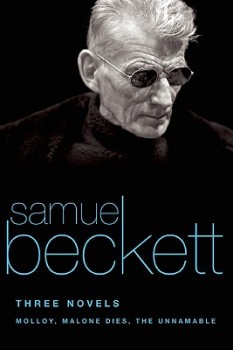“Just concentrate on not making the lazy move.”
– Morton Feldman, American Composer (1926-1987)
 The revisionist working style of fiction writers makes leisure quite seductive. If we don’t work our way through our thorny issues the first time (and we probably won’t), we can always revise again and take charge of the situation the next time through, or the time after that. We cultivate the revision habit as a badge of seriousness and honor, and often view lack of revision as a sign of dilettanteism. Under the best of circumstances revision is an essential part of the fiction process, which is wonderful as long as we keep discovering new things about our characters in draft after draft.
The revisionist working style of fiction writers makes leisure quite seductive. If we don’t work our way through our thorny issues the first time (and we probably won’t), we can always revise again and take charge of the situation the next time through, or the time after that. We cultivate the revision habit as a badge of seriousness and honor, and often view lack of revision as a sign of dilettanteism. Under the best of circumstances revision is an essential part of the fiction process, which is wonderful as long as we keep discovering new things about our characters in draft after draft.
But what happens when we stop discovering and end up merely rewriting for the sake of polish itself? We get bored with our own work and pieces wallow in the limbo of a neglected notebook or shelf. They lose the spark that made us interested in them in the first place, so we send them out, get them rejected, dutifully tweak them before sending them out again.
If this happens, chances are good that we’ve made a lazy move at some point in our process, probably early on. We skated around the quicksand in the first draft and the next few after that, and eventually we trusted that the polish we applied elsewhere makes up for the hard work we didn’t do earlier. While revision gives us many opportunities to get things right, it also gives us many opportunities to make the same lazy moves over and over. We can go through a manuscript a dozen times, but if we keep skating past the same issues, the piece will never satisfy us—and it will probably bore readers on the page as much as it bores us. The lapses that I’ve seen (and committed) fall under three broad umbrellas.
Over-reliance on autobiography
Some writers I enjoy and respect encourage students to write fiction from their autobiographies. Did something exciting and puzzling happen to you? Change the name and the circumstances and violà, you have fiction. Though many wonderful stories and novels have come from their authors’ autobiographies, I don’t believe that encouraging new writers to follow this path is truly beneficial to their development. The hardest and most essential task of fiction is creating and rendering characters who are not ostensibly the self, and encouraging the use of the “disguised self” excuses writers from the toughest work at exactly the time when they need to focus most on it.
This species of laziness applies to experienced writers as well. We can use the presence of a “surrogate me” to lull ourselves into the false belief that we are developing that character sufficiently on the page. We know ourselves better than anyone, after all, and it’s easy to make the assumption that we’re rendering that self truthfully and meaningfully. And don’t all characters come from the self, ultimately?
But when our characters are too clearly autobiographical, we’re tempted to make them coherent in an attempt to make our own lives coherent, and therefore we inadvertently make them stagnant. Autobiographical characters can prevent us from delving into the incoherence of the world and of our very own lives, which is where the excitement and risk of writing happens. Let’s face it: we explore our characters the way dentists drill through our cavities. Who wants to drill through their own cavities themselves? The quick fix of the surrogate me is necessarily limiting, so if you truly want to dig through a character, don’t pick yourself.
Failure to earn our style
We’ve all seen and/or produced fiction that sounds absolutely terrific—the kind of work that makes us say “Wow!” when we first read it. Unfortunately some percentage of that work will inevitably make us say “Huh?” when we re-read it later. The lazy move here is putting style first and the more fundamental elements (like characterization and storyline) second. At absolute best, all we’ll get is something like a Faberge egg that’s pretty on the outside but empty inside.
This approach, unfortunately, also gets taught in creative writing classrooms. I’ve heard of beginning fiction classes organized around what I can only call a “tour de style”—moving from realism to minimalism to magical realism, etc.—as if mastering a variety of techniques is all that’s required to be a writer. As if one simply picks a template and fills it in based on its style.
Writing a magical realist story? Try lush colors and add a sense that the trees are whispering. Feeling in a dada/surrealist mood? Juxtapose a few phrases and physical objects and have your characters behave with no discernible intent. The best writing in any style earns that style by making sure that every word reveals the emotional truth of the characters and their world. It isn’t picked like a template or applied like a spice.
 Formal and stylistic explorations work best when writers use them to clearly express a state of being—I think immediately of Samuel Beckett’s eighty-page paragraph in Molloy (1946), which is the clearest portrait I’ve ever seen of a mind spinning its wheels. But that connection doesn’t always happen. Often the polish and style of our own sentences seduce us into paying too much attention to style—especially when we use word processors that make our first drafts look instantly publishable.
Formal and stylistic explorations work best when writers use them to clearly express a state of being—I think immediately of Samuel Beckett’s eighty-page paragraph in Molloy (1946), which is the clearest portrait I’ve ever seen of a mind spinning its wheels. But that connection doesn’t always happen. Often the polish and style of our own sentences seduce us into paying too much attention to style—especially when we use word processors that make our first drafts look instantly publishable.
We can avoid this lazy move by first seeking the spirit of the piece and its characters, then seeking the words to express that spirit. Otherwise we put the cart before the horse.
Leaving too much up to the reader
I get apoplectic when I hear writers talk about “letting the reader decide.” It sounds generous and democratic to say “to each his own, every reader is different,” but to me it’s a cop-out. The least we owe our readers is a clear rendering of the specific psycho-spiritual experiences that we put our characters through. When I finish a story or a book and don’t come out of it with a crystalline sense of what has been at stake for the characters involved, I probably won’t read that author again; the author has failed to live up to his or her end of the bargain between writer and reader.
That bargain involves many things, one of which is clarity and decisiveness in showing the truths of our characters and their experiences—not wishy-washiness that gets “left up to the reader” to figure out. Yes, we must acknowledge that the reader plays a tremendous and irreplaceable role in the literary experience: without the reader, we’re merely talking to ourselves. Yes, all readers are co-creators of the unique and particular literary experience they have when reading our work.
But leaving too much up to the reader saps the authority of the author. I’m not talking about an authority of interpretation here. I simply want authors to keep hold of their authority by ensuring that readers have a crystal-clear aesthetic experience when they read our work—even if it’s a crystal-clear aesthetic experience of a character’s extremely murky life. And let’s face it: most interesting fiction digs into the souls of characters mired in murkiness and ambiguity. The ones who do it best don’t leave ambiguity ambiguous, but show it to us in all its grim, debilitating detail.
We should not, under the seemingly open-minded guise of “letting the reader decide,” casually cede our greatest authority: how we render our characters’ ambiguity and incoherence with such precision that a wide swath of readers, even those in different eras, can each experience those states of being fully, regardless of what they bring to our work themselves.
I feel like a reactionary and a scold, saying such things as these, but I’m not old enough for that yet. I am also no more immune to laziness as anyone reading this. It’s easy to see lazy moves in the work of others while not seeing them in ourselves, and our most immediate readers can do us great favors by pointing out our lapses. I’ve been graced with two wonderful readers of my novel manuscript who saw a whole lot of lazy moves that I made, and if they hadn’t pointed them out I would probably never have noticed them. I don’t use the word lazy here as a punishing scourge—and I suspect that Morton Feldman didn’t use it that way either. Instead it is a reminder to find where we’ve been lazy and work through our short cuts before they challenge the shape and integrity of what we write.





